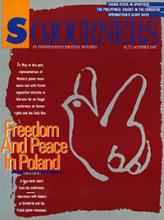THE TAXI DRIVER pointed to the address above the doorway: "Zytnia 3." As I reached for my wallet, he asked in broken English if I could pay the fare in dollars. Relieved at having arrived and distracted by anxiety at what was to come, I handed him a five dollar bill, for which he was exceedingly grateful. I later learned that he could exchange the bill for 5,000 zlotys on the black market, an amount approximately equivalent to his weekly wage.
I was in Warsaw, Poland, for an international conference on peace and human rights that was denounced as illegal by Polish authorities. Before leaving, I had been well apprised I might arrive to find that the church where the conference was to take place had been closed off and the conference organizers placed under arrest. So with some apprehension, I rang the church doorbell.
I was greeted by a Catholic nun clad head to toe in a long, traditional black habit and starched headpiece, her face swathed in white. She was friendly but visibly nervous when she saw my large backpack and camera case, and she quickly discerned why I was there. With gestures she indicated that I was at the wrong place. She looked in both directions before she stepped out of the church to the sidewalk and pointed down the street. I headed off and glanced back to see her frantically directing me toward the courtyard to my right.
Down a stone staircase and through half-lit, damp, and dusty corridors, I found the conference in the basement of the Church of God's Mercy. Crucifixes hung from the ceiling and adorned the walls of the room. People squeezed together in rows on long wooden benches and stood in every available space. The scene made me think of the early Christians meeting together in the catacombs, hiding from the authorities.
Read the Full Article

